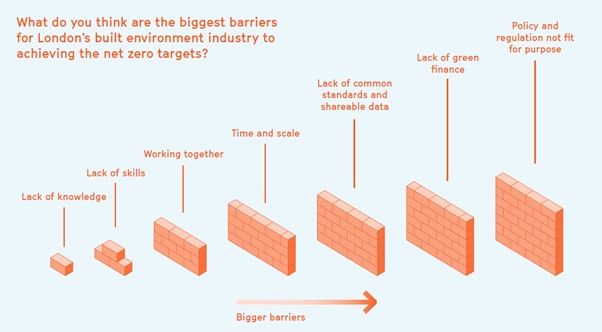During London Climate Action Week, Associate Architect, Michela Ravaglia, outlines London’s response to the Climate Emergency and questions whether enough is being done to achieve the city’s ambitious 2030 net zero carbon target.

In June 2019, the government passed legislation to bring all UK greenhouse gas emissions to net zero by 2050.
Since then, the construction industry has shown an increased commitment to the green agenda, with consultants, developers, contractors and groups, such as Architects Declare, ACAN and UKGBC, across the country responding with new sustainable development strategies and a much-needed focus on zero carbon.
London already has the lowest carbon emissions per person in the UK mainly due to its high density, minimal heavy industry and wide presence of public transport. And with the Mayor of London’s pledge to bring the city’s zero carbon target forward by two decades, it seems the capital has embraced the zero carbon agenda more promptly than other parts of the country.
Even so, Sadiq Khan’s approach has been criticised for not going far enough nor moving quickly enough. However, I believe it has helped to focus the industry’s effort on sustainability and prompted action across the city with an unrivalled number of public and private sector initiatives all geared towards zero carbon.
The New London Plan is due to be published by the Mayor of London before the end of the year. For schemes referable to the Greater London Authority (GLA), it will feature specific policies requiring:
- Detailed calculations for whole life carbon assessment and circular economy statements.
- An extension of the zero carbon target to cover major commercial as well as major residential developments.
- A detailed assessment to ensure the development proposal will reduce overheating risk.
- An addition to the energy hierarchy to include a “be seen” requirement to monitor, verify and report annually on energy performance for at least five years post construction.
Notably, 27 out of the 32 London authorities have declared a climate emergency, outlining their ambitious plans and putting in place strategies to accelerate the green recovery.
The Greater London Authority is also actively targeting the zero carbon agenda with initiatives, such as the Whole Life-Cycle Carbon Assessment consultation and the Business Energy Efficiency Survey for commercial buildings, which aim to bring attention to sustainability targets.
As well as the construction focused initiatives, the Mayor of London has announced plans for an ultra-low emission zone and the ban of petrol cars by 2035. Local zero-emission zones targeted for 2025 will expand to cover the entire city. Transport for London has joined the effort with plans for the London Underground to be fully powered by zero-carbon sources by 2030.

Amongst industry-led initiatives, London Energy Transformation Initiative (LETI) has been one of the most successful. Bringing together experts from across the construction industry this voluntary group has achieved wide support. At the start of the year, LETI launched the Climate Emergency Design Guide and Embodied Carbon Primer setting out the approach, targets and benchmarks that developments in the UK need to achieve to reach net-zero in operation. LETI, which embraces Passivhaus principles, has since started to work on a number of related workstreams and has opened submission for LETI pioneer projects.

New London Architecture (NLA) has followed suit with the release of their Zero Carbon London report earlier this month. The report presents research findings from their members survey and highlights issues around built environment leadership, the policy gap and the need for a green economy to be the centre of the post Covid-19 recovery.

Sustainability focused events, such as the London Climate Action Week (LCAW) which is running for the second year, are bringing together world-leading climate professionals and communities. LCAW continues to promote the discussion around sustainability, Net Zero London and Whole of Society Climate Mobilisation.
These London focused initiatives, together with the enthusiasm and passion of a high concentration of professionals in the capital, show the drive and willingness to achieve zero carbon and promote sustainability within the built environment.
But, to reach the ambitious 2030 net zero target all sectors within the construction industry need to come together and work in close collaboration. We must focus on upskilling and training to improve technical competency, sharing knowledge across the industry, investing in R&D, and developing standardised solutions to make zero carbon the viable construction standard. In parallel, the government will need to put in place a structured set of policies and regulations as well as introduce new standards to provide clarity on how to achieve zero carbon.
London has always been able to adapt and embrace change and I have no doubt it will be capable when it comes to the zero carbon agenda. However, the government will need to play its part in supporting the built environment sector if we are to achieve this ambitious and necessary target.
Michela is our Residential Lead in London specialising in complex, large-scale, mixed-use projects. She is currently training to become a certified Passivhaus Designer which will enable her to champion fabric first and net-zero carbon design.